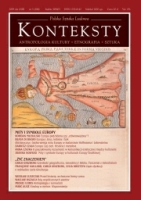Ruchy etnoregionalistyczne wEuropie: Przekształcone czy dysfunkcjonalne wyobrażenie europejskiej przyszłości?
Ethnoregionalistic Movements in Europe: Reshaped or Disfunctional Image of European Future?
Author(s): Wawrzyniec KonarskiSubject(s): Anthropology
Published by: Instytut Sztuki Polskiej Akademii Nauk
Keywords: anthropology; Europe; symbol; myth
Summary/Abstract: Recent decades clearly confirm that ethnicity and regionalism become key words for the processes which are developing simultaneously with the European integration. Thus they remain in mutual dependence and demonstrate their impact on the nation-state in its most transparent, i. e. post (French) revolutionary understanding. The European integration in particular generates a tendency towards ethno-political differentiation of regions, which in this way may be encouraged to escalate their educational, economic, legal, and purely political demands. As a consequence it has an impact on the weakening of a nation-state. The term regionalism – relying upon the local specific – may be perceived in several ways. However, the intention of the hereby article is to understand it as an (ethno) regionalistic movement. Such approach justifies to perceive it as a synonymous with a nationalism of small and dependent nations, as well as ethnic and national minorities. These entities are forced to strengthen their existence while remaining under pressure from large (state) nations which dominate in already existing nation-states. In other words the (ethno) regionalistic movements appear as a small ethno-national entities’ reply on the above quoted large (state) nations’ pressure. It should be here added that the (ethno) regionalistic activities in most cases are typical for many West European states (Faroe Islands and Greenland in Denmark, Bretagne and Corsica in France, South Tyrol in Italy, Basque country, Galicia and Catalonia in Spain, Scotland and Wales in Britain). However, their presence is also noticeable in selected East-Central European (ECE) countries. Bearing in mind its geographical and historical limits it is confirmed by Poland (German minority and Silesians in particular), Austria, Romania, Serbia and Slovakia (Hungarian national minority in those four cases) or on a limited scale by the Czech Republic (Polish national minority). The nature of the ECE quoted examples is irredentist in its character, whereas the Western examples are manifested mostly by their demands towards the regional autonomy, its deepening or in some cases even to an independent status.
Journal: Konteksty
- Issue Year: 2009
- Issue No: 03
- Page Range: 72-79
- Page Count: 8
- Language: Polish
- Content File-PDF

